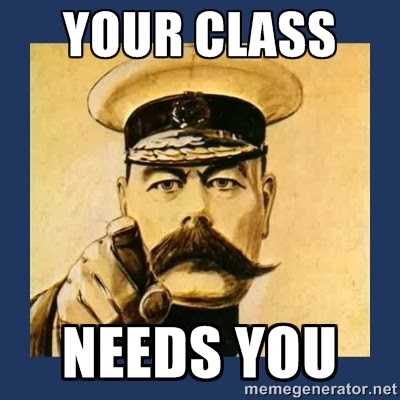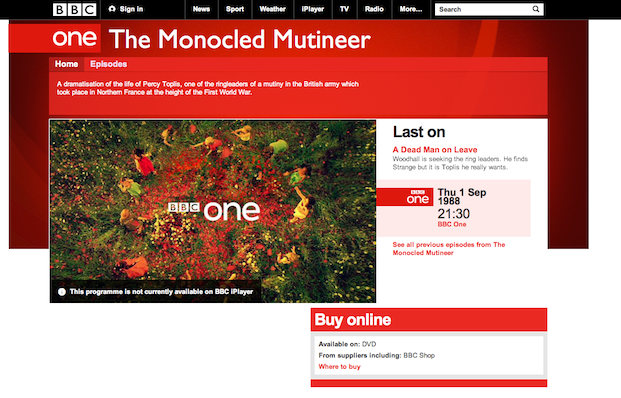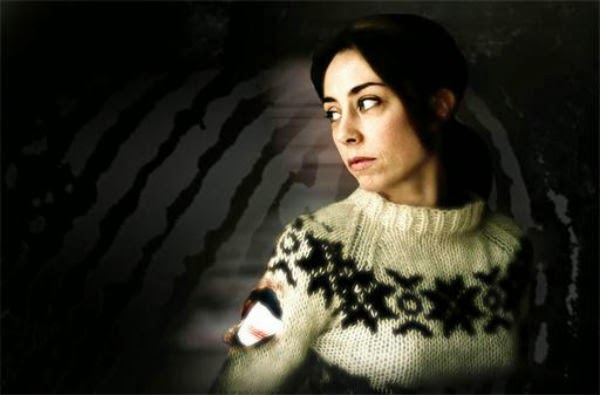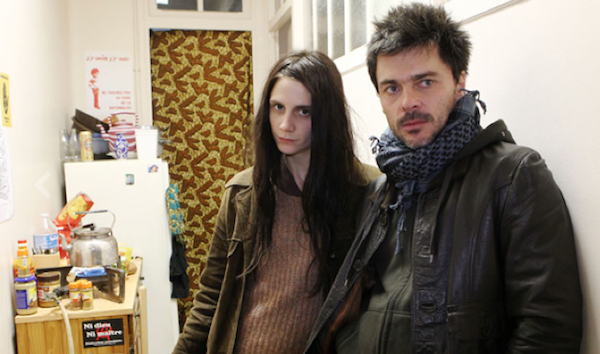“If
any question why we died,
Tell
them because our fathers lied”
So
wrote that infamous ultra-leftist Rudyard Kipling, after his son died
during the First World War.
It's
not just that they're still lying. You'd expect
them to still be lying. It's how they're lying that's significant.
When
Tory Minister Michael Gove made his absurd grandstanding comments
about a “just war”, they led to a brief riposte from me and a debate on 'Newsnight'
chaired by presenter Jeremy Paxman. (Not necessarily in that order of
importance.) A TV debate of course framing it as something
controversial, to be discussed according to the familiar format of
aye-sayers and nay-sayers. Most of us just assumed Gove was preaching
to the choir of the Tory Right, and next week he'd be back to
fulminating about Reds under some different bed.
But
it was then succeeded by 'Britain's Great War', a
four-part documentary series presented by the self-same Paxman. Who
weighed the matter up carefully, before complaining that “it's easy
to laugh” at tally-ho Captains looking forward to the big push,
while labelling deserters “cowards” and conscientious objectors
“cranks”.
So
much slaughter, how did he try to justify it all? Well, he didn't
really bother, did he? The title says it all. He just took the evils
of German imperialism for granted. The build-up to war was ignored,
the situation in Germany was entirely reflected through British
propaganda images. A mock telegram from the Kaiser was read out, all
mispronunciations and expansionist drool. Paxman's dry tone told us
that, to us modern and sophisticated types, such stuff seems crude –
the residue of simpler times. But, in the absence of any other
perspective whatsoever, we were still supposed to take it's jingoism
as essentially correct. The Krauts are not like us, but mere brutes.
That's why they talk so funny. Everyone knows that, don't they?
Except
this rule was suddenly broken for the end of the War, when we were
suddenly allowed to see inside the 'enemy' camp. To be precise, we
saw civil unrest and a starving crowd setting on a horse. You know,
the uncivilised behaviour we'd expect of foreigners. Not the sort of
rot we'd want spreading over here, thank you very much.
The
problem isn't that Paxman is a blimpish, xenophobic bigot with a
continent-sized blind spot – though clearly he is. The problem is
that this was presented not as a polemic or an opinion piece, but as
a balanced documentary. By BBC tradition it's being framed as
objective information. Back in the Sixties, we were being told, some
long-haired types might have had some funny notions about the War.
But now the high's worn off and we can be more sober minded.
Michael
Gove was just the scout. Jeremy Paxman is the enemy advance.
Then
we were back to the illusion of balance. Two programmes set up to form a debate, from a pro- and an anti-war perspective. The first, 'The Necessary War',
to be presented by right-wing historian Max Hastings. The second,
'The Pity of War', by... um... right-wing
historian Niall Ferguson. (Who only recently told the Guardian “the Left love being provoked by me.”) That seems to be the
span of debate as far as political discourse goes today. It's a bit
like setting up a debate on immigration between the UK Independence
Party and the British National Party.
Hastings positioned himself alongside Gove from the outset, announcing on
trailers he'd be attacking the ”'Blackadder'
take on history.” He claimed without a trace of irony that “Britain
must fight to uphold... the rights and freedom of small nations”.
India's misfortune was to be such a large nation, then.
Because
of course lined up against Germany's “aggressive and expansionist”
policies were Britain, France, Russia, Italy and Belgium. Every
single one of them a colonial power. Including the biggest of them
all (Britain) and, by common agreement, the most repressive
(Belgium). As much as Germany's ambitions were “aggressive”, it
was part of the need for the recently unified country to catch up and
gain their “place in the sun”, before the whole world was
entirely carved up between the others. They weren't worse. They were
just late.
It's
often argued that the initial rush to enlist was due to people
forgetting the horrific nature of warfare, after so prolonged a
peace. But of course that's nonsense. There'd been peace in Europe,
yes. But the same period had seen colonial wars aplenty. It was a
long series of magnificent triumphs by machine gunners over spear
throwers that had made war seem such a ripping yarn.
And
if Hastings is siding with Gove, scratch the surface of Ferguson's argument and you get something fairly close to UKIP. It's
the common Right bugbear of Euroscepticism, the crucial question is
whether Britons risk being made into slaves. “The
neutrality of Belgium,” he asserts, “is not self-evidently a
cause worth the lives of... Britons.” Even if the result had been a
continent-wide German empire, this would “simply have created
something like the European Union”. Why, the
underlying message states, should we let ourselves be dragged into
their squabbles?
But
he also tries on a more progressive hat. He's the only figure so far
to ask a fairly obvious question – was the War really
some German plot? And, short of some 'inside job' theory that the
Kaiser was behind the shooting of Archduke Ferdinand, it manifestly
wasn't. It was the tangled system of alliances that let one chance
event snowball into full scale war. The cock-up theory of history
triumphs over the conspiracy theory yet again.
And
he's the only figure so far to look evenly at the question of the
German 'threat'. And again, as soon as you do the whole scare story
falls apart. As he points out “Germany was in some ways more
democratic than Britain... and in every way more democratic than
Tsarist Russia.” (Though this doesn't stop him complaining that the
War “left the British empire at the end of it all in a much
weakened state.” Freedoms only counting at home, it seems. Perhaps
something you'd expect from the author of the series 'Empire:
How Britain Made the Modern World'.)
Yet
that reference to democracy also exposes the limits of his thinking.
It's like he imagines it all happened through the Kaiser having a
secret kindly side. Against the xenophobic stereotype of order-loving
proto-fascist Krauts, it was Germany which had Europe's most sizeable
worker's movement. And that movement needed appeasing, through social
reforms. (Though initially it was mostly marshalled into support for
the War, largely by railing against the autocracy of Tsarist Russia.)
The
actual underlying causes for war, beneath the spark that erupted at
Sarajevo, that can wait for another time. For now let's quote Karl
Leibnecht who, despite being a Reichstag Deputy in 1914, was
prevented from reading out the following speech:
“The
present war was not willed by any of the nations participating in it
and it is not waged in the interest of the Germans or any other
people. It is an imperialist war, a war for capitalist control of the
world market, for the political domination of huge territories and to
give scope to industrial and banking capital.”
Instead,
let's focus on the immediate result of the War. Which might briefly
be summarised as “good for the workers, not so good for the
bosses”. A significant, perhaps the predominant, reason the war had
ended had been a widespread refusal to fight. And the period that
followed it saw the biggest uprisings in world history. As Dave Lamb has commented:
“There
is no more promising material for revolution than soldiers returning
from wars, careless to danger and accustomed to risks and to taking
collective action. Peace held no prospect for them… That winter of
1918-1919 was the nearest Britain ever came to social revolution: the
authorities lacked the support of the armed forces and the careerists
in the TUC were faced with a similar situation in industry.”
But
of course none of that penetrates. The workers and soldiers stay off
stage for this debate, waiting to see whether General Hastings orders
them up the hill or Kaiser Ferguson tells them to stand at ease. Even
the ever-unobservant Paxman comments how post-War Britain was
manifestly different to pre-war, and more akin to the place we live
now. But, much like the German 'threat', he doesn't bother going into
why that should be.
In
fact, even the “left-wing” satires which so incited Gove mention
none of this. The sole exception is the one drama - 'The
Monocled Mutineer' (1986), which focused on the Etaples
mutiny. And while 'Blackadder' is almost on
perpetual rotation, 'Mutineer' has been re-shown
precisely once, two years later. (Perhaps a handy slogan for the Tory
press: “The BBC, transmitter of left-wing propaganda from 1986 to
1988, with the exception of the year 1987.”)
When
Gove criticised anti-war satires such as 'Oh, What A Lovely
War' (originally a 1963 stage musical) he was, true to
type, railing against the Sixties. But there's something else. Even
if the popular unrest that followed the War has been airbrushed from
history, knowledge of how terrible a folly that war was leaves an
untugged thread leading back to it. A thread that must be snipped.
And as ever the way to snip that thread isn't so much to argue, but
to shift the apparent centre of debate away from where it lies. A lot
of clever and professional people, they sat down and talked about the
First World War. And they decided it was just fine after all.
More
speculatively... actually much more
speculatively...
Many
people pointed out that, while Gove labelled criticism of the War as
“left wing”, 'Oh, What A Lovely War' was
actually based on Alan Clarke's history 'The Donkeys'
(1961), to the point that he even won royalties from the film
version. And Clarke was not just a Tory MP, but an arch-Thatcherite
once blacklisted by his own Central Office for being too right-wing.
At the time, this was considered further evidence of Gove's crass
stupidity. (And, we shouldn't forget, this is the
man who complained that 50% of schools had been found to be below
average.)
Nevertheless,
maybe that shows another thread there that needs snipping. Thatcher's
common origins were of course greatly exaggerated by her followers,
and were to no degree shared by the Eton-educated Clarke.
Nevertheless, appearances count and Thatcherism often portrayed
itself as a challenge to the established order. Opportunities needed
to open up for the aspirational, to those who wanted to “get on”.
To Clarke, the folly of the well-bred Generals in the War was just an
extreme case of careers going to the privileged rather than being
open to ability. They were 'donkeys' compared to the 'lions' of the
common soldiers in their lack of dynamism and bravery. But they were
also 'donkeys' in the sense of being pack animals in a machine age,
blimpishly attached to old methods. Notably, he characterises them as
having an obsolete obsession with cavalry.
But
what of today? Cameron went to election on an oxymoronic platform of
'progressive conservatism'. (Tagged by his deriders as “hug a
hoodie”). When voting arithmetic pushed him into a coalition with
the Lib Dems, you might have thought that would push him further in
the socially liberal/economically conservative direction. In fact
it's been the opposite. The widespread backbench revolt against gay
marriage seems to have put him off even tokenistic forays.
Instead
what we've been treated to is clear-cut ruling class solidarity – a
government of the toffs, by the toffs, for the toffs. If anyone is
poor today it is of course their own fault, for choosing to live on
Benefits Street. But more than that, social mobility has shrunk to
the point where it's statistically non-existent. Working class voters
sometimes saw in Thatcherism the opportunity to start leading middle
class lives. But now the middle class is effectively shrinking. As
the cartoonist Martin Rowson put it, “social mobility can go down
as well as up”.
Were
the aspirational, with their vocational qualifications and spirit of
enterprise, the Notts Miners of the voting booth? The willing saps,
who would strive for promissory notes, only to see them ripped up
later? Now we are in the opposite situation to the end of the First
World War, where there's little if any class struggle opposition, was
it not inevitable that we would then start to retreat into the
society that existed before the First World War?
Where one of the most primary rules was – don't question your
betters.
(NB.
Some of the quotes from Hastings and Ferguson come from the print
version of the 'Radio Times', and don't seem to be
reproduced on-line.)
Further
reading for the obsessive:














